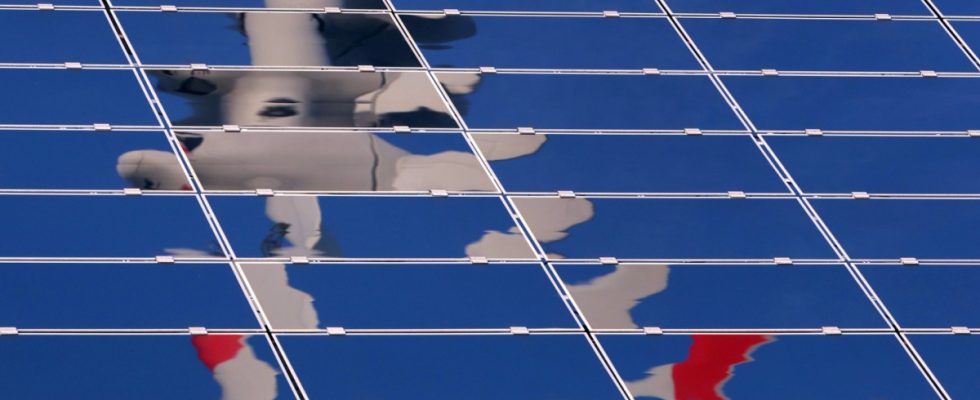The man in question is not even present this Thursday. Hubert Aiwanger (Free Voters) gives a welcoming speech for the farmers’ association in Herrsching. The Economics and Energy Minister lets his new State Secretary speak in the state parliament. So what does Tobias Gotthardt (FW) say? He recommends, among other things, “reading the tweets” that Aiwanger writes about the energy transition. They are “a good source,” says Gotthardt. And he thinks that the opposition could stop “badmouthing numbers that are actually good in Bavaria.”
The Maximilianeum is once again about the expansion of renewable energies. This time the SPD parliamentary group initiated this debate. Your urgent motion is entitled: “State Parliament demands report from State Minister Hubert Aiwanger on shaping the energy transition in the next five years.” What is in the new coalition agreement is apparently too thin for the SPD. The minister should therefore explain himself and that there is a need for clarification, Aiwanger himself made sure of that. As a reminder: the Free State must be climate neutral by 2040. But in September Aiwanger questioned this. “We are setting ourselves this goal,” he said succinctly on Bavarian television. “We don’t know whether we’ll achieve it.”
It wasn’t just the opposition that was surprised. Even Environment Minister Thorsten Glauber, Aiwanger’s party colleague, felt compelled to clarify: “The Free State has legally committed itself to becoming climate neutral by 2040. This legal regulation will be implemented.” There was also criticism from the coalition partner. Agriculture Minister Michaela Kaniber (CSU) even accused Aiwanger of “denying climate change.” A few weeks later, Kaniber said that the energy minister should “read up” on the subject of wind energy and not just babble things out into the world.
Bavaria wants to build 1,000 new wind turbines by 2030. And by 2050, a quarter of Bavaria’s heat needs should come from geothermal energy. Exactly how the Free State wants to achieve this is unclear to SPD parliamentary group leader Florian von Brunn. He calls for a plan from Aiwanger with “concrete measures” and “measurable intermediate steps”. He lacks the belief that just “flipping your suspenders will significantly advance the energy transition in Bavaria,” says Brunn.
Bavaria is in first place in many areas – “we won’t let that be talked down to us”
He won’t get a plan on Thursday, but FW deputy parliamentary group leader Bernhard Pohl announced that Aiwanger would make a government statement “next year.” So for now it’s just a matter of clicking your suspenders. 500 applications for new wind turbines are “in the pipeline”, Bavaria is “clearly in first place” when it comes to solar energy, as well as hydropower and almost everywhere else. Have you heard it all before? “We won’t let that be talked down to us,” says Gotthardt.
If you like, at least the AfD is doing him this favor. She thinks that Bavaria is already doing a lot with the energy transition. Or rather: too much. Wind turbines are “disfiguring” landscapes and “historic buildings are being robbed of their charm by solar cells,” says Florian Köhler. This has also been heard before, as has the complaint from the Greens, who, with only six new wind turbines built in 2023, see “a lot of room for improvement” and the potential for photovoltaics on state roofs is far from being exhausted. “Pick up the pace here,” demands Martin Stümpfig.
And the CSU? After the state election, she vowed to tackle Aiwanger harder. In order to weaken him, we had to talk more about his performance as a minister, that was roughly the plan. Immediately after the election, CSU honorary chairman Theo Waigel openly expressed what most people in his party were thinking: “I haven’t noticed any particular economic policy achievements with Aiwanger over the last five years.” It couldn’t be more devastating.
On Thursday, CSU MP Walter Nussel emphasized that his group “every now and then puts the finger on the coalition partner and says: This has to happen faster.” But Nussel is only really tackling the federal government, which must “finally make faster approval processes” possible. In Herrsching, at the farmers’ association, the CSU is even taking a step towards Aiwanger, who is now also responsible for hunting and state forests. “It is crucial that we stick together properly,” says Agriculture Minister Kaniber, who in return has been given responsibility for tourism and gastronomy. It shouldn’t be about disputes between “any personalities”. “I feel a little bit together,” says Kaniber.

